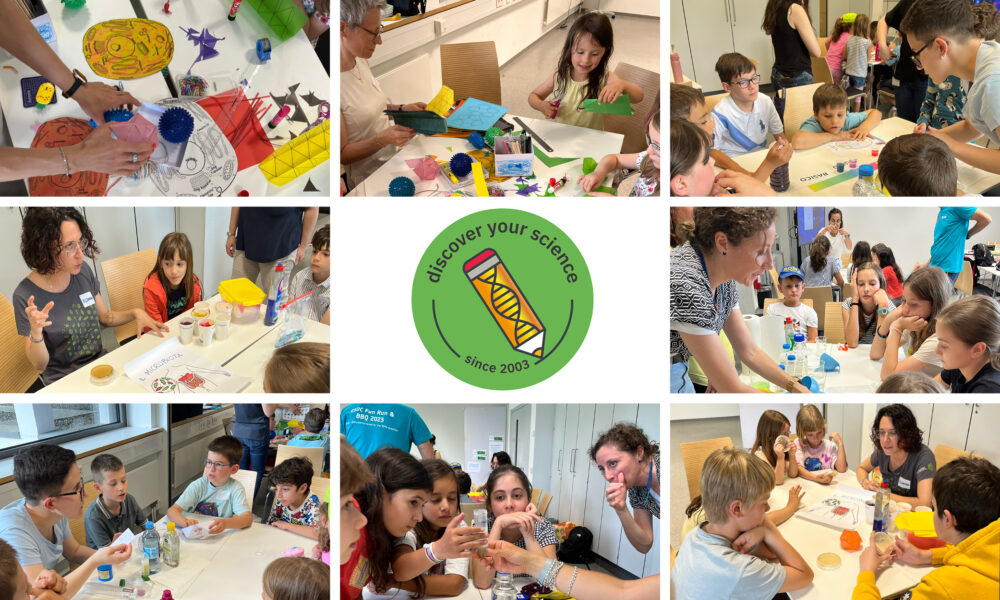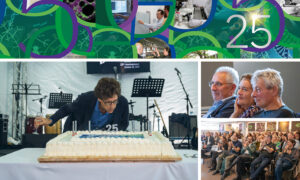The workshop was supported by the Science Education and Public Engagement office (SEPE). To hear about public engagement opportunities at EMBL, which could include becoming a School Ambassador, volunteering at a science fair, training as a facilitator at The World of Molecular Biology exhibition, or supporting the development of new teacher training resources, sign up to the SEPE newsletter or email sepe@embl.de. To find out more about Native Scientists, visit their website.
Inspiring young minds by breaking language barriers
A hands-on workshop offered an excellent opportunity for scientists to connect with children with whom they share a common language

It is part of EMBL’s mission to spark a passion for science among young people – and as far as post-doctoral fellow Agnese Loda is concerned, this mission can never start too early.
“Even the youngest children have a natural curiosity about the world which is the perfect starting point for talking about science,” she said. “You can see them light up with amazement.”
Loda has run several science workshops with children under the age of 12. Each time, she has noticed a real impact on their level of enthusiasm for, and understanding of, science.
As a volunteer with the non-profit organisation Native Scientists, Loda runs these workshops in her native Italian, which also gives the young, Italian-speaking participants the opportunity to observe their own native language used in a professional setting. Native Scientists connects scientists with children who speak the same native language, therefore enabling community outreach in a unique way.
This summer, EMBL hosted a hands-on workshop for Italian-speaking children, in partnership with Native Scientists. The event was organised by Loda and a team of scientist colleagues, and supported by EMBL’s Science Education and Public Engagement Office (SEPE).
A total of 25 children aged five to 12 attended the workshop, which was hosted in the FlexLab at Heidelberg. EMBL colleagues supporting the event included visiting researcher Giulia Mizzon, scientific programmer Eleonora Mastrorilli, and post-doctoral fellow Emma Kneuss. EMBL alumni including Sabrina Sartori and Emilia Esposito also offered their time and expertise.
The activities on offer included extracting DNA from a banana, using origami to represent a virus, building the DNA double helix with candies, and demonstrating the pH of foods from red cabbage to lemon juice. The children collaborated in small groups at each ‘workstation’, moving through the activities carousel-style.
“All the kids liked it a lot,” says Loda. “The DNA experiment was the most successful. They were fascinated with that, being able to see DNA, and also surprised that we share some of our DNA with fruit.”
Although all the experiments worked well, Loda says talking about failure is also important.
“The kids were surprised that sometimes our experiments don’t work. In science, we try something, and when it fails, we work out what went wrong. It’s all about coming up with new ideas and finding solutions,” she said.
Seeing things from this perspective can really help kids approach their own learning differently.
Loda feels that workshops like these demystify science too: “One girl said she didn’t think scientists were normal people, maybe because of the way we’re represented in cartoons and the media. At the end she said scientists were normal, after all. That was a relief!”
In linguistic terms, it can be very powerful for the children to hear their native language in a professional setting, outside of the family context where they are most frequently exposed to Italian.
“Being bilingual is not always a source of pride for them, sometimes kids feel embarrassed that they speak a different language at home,” said Loda. “During the Native workshops, I normally show a photo of our lab, where people from all sorts of different backgrounds and speaking many languages come together to do really cool work. It shows that no matter where you come from, science is a common ground.”



